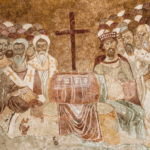The Apostles’ Creed is one of the most earliest and most foundational documents of the Christian church. Emerging from the mists of the second century and an earlier Roman Creed, the Apostles’ Creed represents a core confession for Catholics and Protestants alike. When we read and recite the Creed we join with brothers and sisters from across the globe and the millennia—and discover that we still believe in the same gospel.
This week TGCA begins a new series on the Creed from a range of different contributors.
I believe…
What do you believe in? What do you believe are the most important facts of your life—what has made you like you are and where you are headed. What do you believe the world is really all about?
Christianity has, from its earliest days been a message of personal belief and personal salvation: we must be saved individually or not at all.
As we will see in the weeks to come, The Apostles’ Creed offers great answers to these sort of questions. It tells us what the world is about and what we should be about if we want a place in that world.
It also reminds us that Christianity has, from its earliest days been a message of personal belief and personal salvation: we must be saved individually or not at all. We cannot rely on the second-hand faith of our family or tribe. Although we are saved to belong to a people, we can have no part in that community unless we first believe for ourselves.
So what must we (I) believe in?
I believe in God, the Father …
The opening words of the Creed speak of “God the Father.” This starting point is consistent with earlier (and later) confessions and with Scripture too. Jesus commands his apostles to baptise new disciples in “the name of the Father and of the Son and of the Holy Spirit.” Similarly, Paul’s creed-like words in 1Corinthians 8:6 declare that:
… for us there is one God, the Father, from whom are all things and for whom we exist, and one Lord, Jesus Christ, through whom are all things and through whom we exist.
This “Father”is the first person of the Trinity, and he is also called “God” because all things come from him.
This “Father”, then, is the first person of the Trinity, and he is also called “God”—not to exclude the Son and Spirit—but because all things come from him. He is the (eternal) source of the Son and Spirit. He is the initiator of all the works of the Godhead. As Calvin puts it:
… to the Father is attributed the beginning of action, the fountain and source of all things; to the Son, wisdom, counsel, and arrangement in action, while the energy and efficacy of action is assigned to the Spirit … the Father being considered first, next the Son from him, and then the Spirit from both. (1.13.18)
This order is very important for us to remember—especially in the light of recent evangelical debates over trinitarian subordination and the unity of the divine will. If we only stress the unity and equality of the persons then there is no sense in which the Father personally does anything. He doesn’t create; he doesn’t send; he doesn’t save.[1]
Three Kinds of Fatherhood
Getting back to the Creed in its original setting, however, it is hard to say how much these eternal realities were in mind. Theologians certainly spoke of God’s fatherhood in these terms: “the Father is God and the Son is God; for that which is begotten of God is God” writes Irenaeus of Lyon (AD130-202) in his Demonstration of the Apostolic Preaching. But it would take the fourth century Trinity debates to fix everyone’s attention on this type of fatherhood (more on this in a moment).
In the Arian disputes, faithful bishops would have to fight-off those who wanted to limit God’s Fatherhood of Jesus to a metaphorical or covenantal meaning
In the meantime, the next words of our Creed speak of God as the “Almighty (lit. – the One who rules all) Creator of heaven and earth.” So maybe “Father” here is a reference to God’s universal fatherhood: the way God is the source and sustainer of every creature. This is a marginal use of the word in the Bible but it is certainly there (c.f. Acts 17:28-29; James 1:17).
On the other hand, the third line of the Creed speaks of “Jesus Christ, his only Son”. Does this take us back to the idea of Jesus eternal sonship? Maybe. But the Creed might be thinking about God’s covenantal fatherhood—the special relationship of significance and protection enjoyed by God’s chosen people, whether Israel (Ex 4:22-23) or David’s heirs (2Sam 7:14) or those of us who belong to Christ (John 1:13).
In the Arian disputes, the fight would focus on this meaning too. Faithful bishops would have to fight-off those who wanted to limit God’s Fatherhood of Jesus to this metaphorical or covenantal meaning—i.e. people who wanted to reduce Jesus to a creature with a special relationship to God. Against this, the orthodox leaders would reaffirm the position of Irenaeus—Jesus is literally (and eternally!) God’s natural Son.
Father in Every Sense
But we should also note that those who argued for the other meanings were also partly right. With Jesus we don’t have to choose between these meanings. God is his Father in every sense.
Eternal Father
Scripture is clear that Jesus is God’s real eternal Son—another person exactly like the Father who comes from the Father and shares in all the Father is and does:
In these last days [God] has spoken to us by his Son, whom he appointed the heir of all things, through whom also he created the world. He is the radiance of the glory of God and the exact imprint of his nature. (Heb 1:2-3)
Father of Creation
Yet as a man, Jesus also relates to God the Father as a creature. When he exhorts us to take our cue from the lilies and the birds (Matt 6:25-30), he speaks from experience. He knows what it is to live in simple trust, believing that his “heavenly Father” (and ours) will provide.
Father of the Elect
With Jesus we see God’s Fatherhood in its truest and fullest sense.
And Jesus also knows God as covenantal Father. As David’s true heir he is the true son of 2Samuel 7. This is what people in the gospels often have in mind when they call him God’s son (e.g. Matt 26:63; John 1:49; John 11:27). It must be what Paul has in mind when he says that Jesus was “appointed to be God’s Son by his resurrection,” (Rom 1:4); what the writer of Hebrews has in mind when he quotes Psalm 2 (Heb 1:5).
So with Jesus we see God’s Fatherhood in its truest and fullest sense. We see the Father of creation; the Father of the chosen; the Father of the eternal Son.
Jesus’ Father … and Ours
And here is the most astonishing truth of the Christian gospel. If we come to God in Christ we can know God as our Father in these ways too. Of course, we will never become God’s natural children, but we will be joined to the One who is—and we will share in all his privileges:
Of course, we will never become God’s natural children, but we will be joined to the One who is—and we will share in all his privileges
We will relate to God the Father of creation as the most beloved and perfect of his creatures: holy creatures whose bodies and communities are temples of God; eternal creatures destined for a new heaven and new earth; blessed creatures whose lives and futures are nurtured by a Father who promises to make all things turn out for our good (Rom 8:18-30).
We will also share in Christ’s covenantal sonship. When the Father made Jesus the ruler of the universe, he included us. We will share our brother’s throne (Rev 3:21); rule the nations with Christ (Rev 2:26-27); judge the angels with him (1Cor 6:2-3 c.f. John 5:22).
And we will bask in the love of the eternal Father for his eternal Son. Jesus declares that God loves us “even as” he loves his Son—the Son he loved “before the creation of the world” (John 17:23-24). The Father who made the world for his Son (Col 1:16) also predestined us (Eph 1:4) to share in that too:
The Spirit himself bears witness with our spirit that we are children of God, and if children, then heirs—heirs of God and fellow heirs with Christ, provided we suffer with him in order that we may also be glorified with him. (Rom 8:16-17)
A Great Confession
When we say “I believe in God the Father” we do far more than make a statement of rational assent. We speak of the most ancient and beautiful relationship—the relationship between God the Father and God the Son. We point to good beginning and a good ending for a world born of that Love. And we declare, shockingly and boldly that we have a share in that relationship too. God the Father is my Father and your Father through Jesus Christ our Lord.
That is a world worth believing in.
[1] What we will be left with, in other words, is the sub/super personal essence operating through the person of the Son. It will not help to argue—as, for example, B.B. Warfield did—that the order of operations arises from a temporary covenant. That just leaves us with the Father pretending to be responsible for a plan made previously under a different (and thoroughly mysterious) dispensation.















